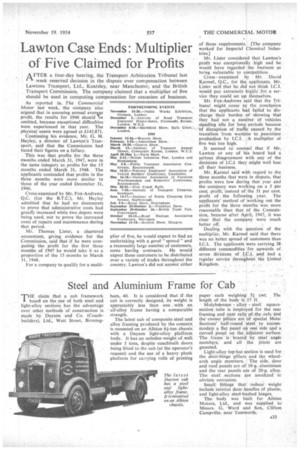Lawton Case Ends: Multiplier of Five Claimed for Profits
Page 67

If you've noticed an error in this article please click here to report it so we can fix it.
AFTER a four-day hearing, the Transport Arbitration Tribunal last
week reserved decision in the dispute over compensation between Lawtons Transport, Ltd., Kearsley, near Manchester, and the British Transport Commission. The company claimed that a multiplier of five should be used in computing compensation for cessation of business.
As reported in. The Commercial Motor last week, the company also argued that in assessing annual averue profit, the results for 1946 should 'be omitted, because exceptional difficulties were experienced irr that year. The physical assets were agreed at E145,871.
Continuing his evidence, Mr. G. H. Hayley, a director of Lawton's Tran• sport, said that the Commission had based their figures on a fallacy.
This was that profits for, the three months ended March 31, 1947, were in the same category as profits for the 15 months ended March 31, 1948. The applicant's contended that profits in the three months were more similar to those of the year ended December 31, 1946.
Cross-examined by Mr. Fox-Andrews, Q.C. (for the B.T.C.), Mr. Ilayley admitted that he had no documents to prove that administrative costs had greatly increased while two depots were being used, nor to prove the increased costs of repairs and maintenance during that period.
Mr. Thomas Lister, a chartered accountant, giving evidence for the Commission, said that if he were computing the profit for the first three months of 1947 he would take it as a proportion of the 15 months to March 31, 1948.
For a company to qualify for a multi plier of five, he would expect to find an undertaking with a good " spread " and a reasonably large number of customers, some having contracts, He would expect those customers to be distributed over a variety of trades throughout the country. Lawton's did not answer either of those requirements. [The company worked for Imperial Chemical Industries.] Mr. Lister considered that Lawton's profit was exceptionally high and he would have regarded the business as being vulnerable to competition. Cross examined by Mr. David Karmel, Q.C., for the applicants, Mr. Lister said that he did not think f.C.I, would pay extremely highly ,foir, a service they could set up themselves.
Mr. Fox-Andrews said that the Tribunal might come to the conclusion that the applicants had failed to discharge their burden of showing that they had not a number of vehicles standing idle for long periods because laf disruption of traffic caused by the transition from wartime to peacetime production by I.C.I.. A multiplier of five was too high.
It seemed to counsel that if Mr. Lawton or any of his board had a serious disagreement with any of the decisions of 1.C.I. they might well lose all their business.
Mr. Karmel said with regard to the three months that were in dispute, that profits were low during that year and the company was working on a 5 per cent, profit. instead of the 31 per cent. profit of the following year. The applicants' method of working out the profit for the three months was more reasonable than that of the Commission, because after April, 1947, it was clear that the company were much better off.
Dealing with the question of the multiplier, Mr. Karmel said that there was no better spread of customers than I.C.I. The applicants were carrying 38 different commodities for upwards of seven divisions of and had a regular service throughout the United Kingdom.




































































































